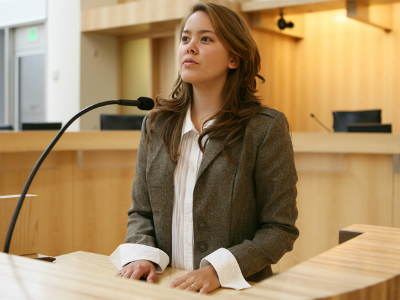
For the first time, a mock inquest of a coroner’s court will be one of the big draws at Community Care Live in November.

Make sure you’re ready if you’re called to give evidence to a coroner’s court by attending our mock inquest.
Hosted by Fiona Butler, barrister and partner at Browne Jacobson LLP, the mock court will take social workers through the inquest process and the part they play. According to Butler, inquests requiring the evidence of social workers are becoming more commonplace, meaning that it is likely that at some stage they will find themselves involved in one; the mock court aims to help them prepare for that eventuality.
Connor Sparrowhawk case
It is a timely reminder given that the inquest into the death of 18-year-old Connor Sparrowhawk begins this week. Connor, who had autism and learning disabilities, died, preventably, in a learning disability unit in July 2013 after drowning in the bath.
Butler has written a guide to the coroner’s court to accompany the mock inquest which is available to licence holders of Community Care Inform Children and Inform Adults. In the guide, Butler advises on the content of a social worker’s report/statement to a coroner:
- Be factual throughout – never assume or hypothesise.
- Do not include hearsay (‘s/he told me x’).
- Avoid jargon and acronyms – if they are needed to explain departments/procedures, ensure you include an explanation in simple terms.
- Don’t assume knowledge on behalf of the coroner – they are not a social worker!
- Be unbiased, and remain neutral.
- Tell the story of your involvement in a way that makes sense, chronologically is preferred.
- Use numbered paragraphs throughout.
- Sign and date the statement.
An important point for social workers to bear in mind, she says, is to remember that national and local media will be present at any high profile inquest, so they need to behave appropriately going into and leaving court. Being photographed smiling, for example, looks unprofessional and gives the wrong impression.
Top tips
Butler’s top tips for social workers attending an inquest are:
- Preparation, preparation, preparation.
- You are a witness of fact: stick to the facts and avoid opinion and assumption.
- Tell the story of your involvement in a clear, chronological manner.
- Explain procedures where necessary: do not assume knowledge on behalf of the reader.
- Remain professional at all times.


 Bournemouth, Christchurch and Poole
Bournemouth, Christchurch and Poole  Hampshire County Council
Hampshire County Council  Lincolnshire County Council
Lincolnshire County Council  Norfolk County Council
Norfolk County Council  Northamptonshire Children’s Trust
Northamptonshire Children’s Trust  South Gloucestershire Council
South Gloucestershire Council  Wiltshire Council
Wiltshire Council  Wokingham Borough Council
Wokingham Borough Council  Children and young people with SEND are ‘valued and prioritised’ in Wiltshire, find inspectors
Children and young people with SEND are ‘valued and prioritised’ in Wiltshire, find inspectors  How specialist refugee teams benefit young people and social workers
How specialist refugee teams benefit young people and social workers  Podcast: returning to social work after becoming a first-time parent
Podcast: returning to social work after becoming a first-time parent  Podcast: would you work for an inadequate-rated service?
Podcast: would you work for an inadequate-rated service?  Family help: one local authority’s experience of the model
Family help: one local authority’s experience of the model  Workforce Insights – showcasing a selection of the sector’s top recruiters
Workforce Insights – showcasing a selection of the sector’s top recruiters 

 Facebook
Facebook X
X LinkedIn
LinkedIn Instagram
Instagram
Comments are closed.